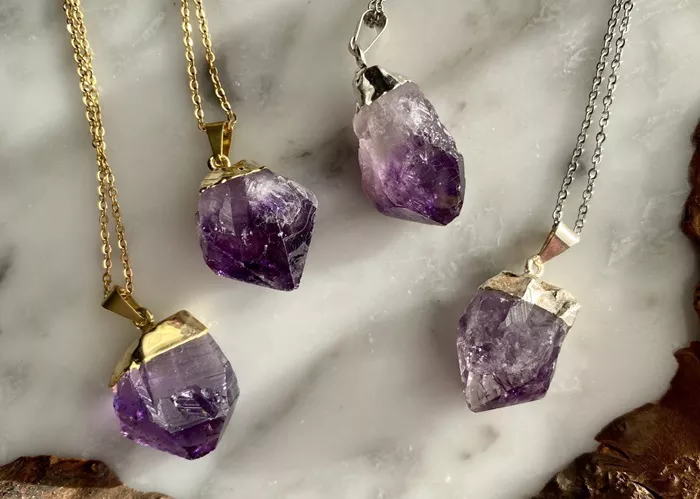Amethyst, a stunning purple variety of quartz, is beloved for its beauty and purported spiritual benefits. Whether used in rings, necklaces, bracelets, or earrings, amethyst jewelry can add a touch of elegance to any outfit. However, one common question among amethyst enthusiasts is whether it is advisable to wear amethyst jewelry while sleeping. This article explores the suitability of wearing amethyst jewelry to bed, the potential risks involved, the safest types of amethyst jewelry for sleep, and additional considerations for new wearers.
Can I Wear Amethyst Jewelry to Sleep?
The short answer is yes, you can wear amethyst jewelry while sleeping, but there are several factors to consider. Amethyst is a relatively durable gemstone with a Mohs hardness of 7, which means it is resistant to scratching and damage under normal conditions. However, sleeping with jewelry on can introduce variables that may affect both the jewelry and the wearer.
While many people find it comfortable and safe to wear amethyst jewelry during sleep, others might experience discomfort or complications. Factors such as the design of the jewelry, the fit, and individual sensitivity play a significant role in determining whether it’s a good idea.
The Hazards of Wearing Amethyst Jewelry When Sleeping
Physical Damage to the Jewelry
Sleeping with amethyst jewelry, especially if it has a prominent design, can lead to physical damage. The jewelry may be subjected to pressure or friction from pillows, bedding, or body movements. This can result in scratches, dents, or even loosening of the gemstone from its setting. Rings, in particular, are at risk due to the constant pressure and movement.
Discomfort and Skin Irritation
Wearing jewelry while sleeping can sometimes cause discomfort. Amethyst rings or bracelets may press into the skin or get tangled in bedding, leading to an uncomfortable night. For some individuals, prolonged contact with jewelry can also cause skin irritation or allergic reactions, especially if the metal used in the jewelry is not hypoallergenic.
Cleaning and Maintenance Issues
Amethyst jewelry worn during sleep will be exposed to oils, sweat, and other debris from the body and bedding. This can result in the accumulation of grime, necessitating more frequent cleaning. Regular cleaning is essential to maintain the jewelry’s appearance, but improper cleaning methods can lead to damage.
The Safest Amethyst Jewelry to Wear in Bed
If you choose to wear amethyst jewelry while sleeping, consider opting for pieces that are designed with comfort and durability in mind:
Simple and Low-Profile Designs
Jewelry with a simple, low-profile design is generally safer to wear while sleeping. For example, small stud earrings or delicate pendants with smooth settings are less likely to cause discomfort or get damaged. Avoid large or protruding designs that could press into your skin or catch on bedding.
Smooth and Comfortable Settings
For rings or bracelets, select those with smooth, rounded edges. Jewelry that lacks sharp edges or bulky settings is less likely to cause irritation or get caught on fabrics. Bands with a sleek design or those that are made from soft, flexible materials can be more comfortable for overnight wear.
Hypoallergenic Materials
If you have sensitive skin, choose amethyst jewelry made from hypoallergenic metals, such as surgical steel, titanium, or certain types of gold that are less likely to cause allergic reactions. These materials help minimize skin irritation.
See also: Are Chanel Earrings Real Diamonds?
How to Wear Amethyst Jewelry Safely
To ensure safe and comfortable wear of amethyst jewelry while sleeping, follow these guidelines:
Opt for Minimalist Pieces
Select jewelry pieces that are minimal in design and less likely to interfere with your sleep. Avoid items with dangling components or sharp edges that could cause discomfort.
Check Fit and Security
Make sure that the jewelry fits well and is securely fastened. For rings, ensure that they are not too tight or loose. Loose jewelry can get caught or fall off, while tight jewelry can cause discomfort.
Clean Regularly
Clean your amethyst jewelry regularly to remove any accumulated oils, sweat, or dirt. Use a soft cloth and mild soap solution for cleaning, and avoid harsh chemicals that could damage the gemstone or setting.
Precautions for Wearing Amethyst Jewelry for the First Time
If you are new to wearing amethyst jewelry, take the following precautions:
Gradual Introduction
Start by wearing the jewelry for short periods to see how your skin reacts and how comfortable you feel. Gradually increase the wearing time to ensure that you can sleep comfortably with the jewelry on.
Monitor Skin Reactions
Pay attention to any signs of irritation or discomfort, such as redness, itching, or swelling. If you notice any adverse reactions, remove the jewelry and consult a dermatologist if necessary.
Adjust as Needed
If you experience discomfort, consider adjusting the fit of the jewelry or choosing a different piece for sleeping. Some individuals may find that sleeping without jewelry is more comfortable.
When to See a Doctor
If you experience any of the following issues while wearing amethyst jewelry, it is important to seek medical advice:
Persistent Skin Irritation
If you experience persistent skin irritation, redness, or swelling that does not improve after removing the jewelry, consult a healthcare professional for advice on managing the condition.
Allergic Reactions
If you suspect an allergic reaction to the metal or gemstone, seek medical attention to determine the cause and receive appropriate treatment.
Injuries or Infections
If you sustain any injuries or develop infections related to wearing jewelry, seek medical treatment promptly to address the issue and prevent complications.
Conclusion
Wearing amethyst jewelry while sleeping is a personal choice that depends on individual comfort and the design of the jewelry. While many people find it safe and comfortable, others may experience discomfort or potential hazards. Choosing minimalist, well-fitted jewelry and maintaining proper cleaning practices can help mitigate potential issues. If any problems arise, such as skin irritation or allergic reactions, seeking medical advice is crucial for ensuring your health and well-being.

